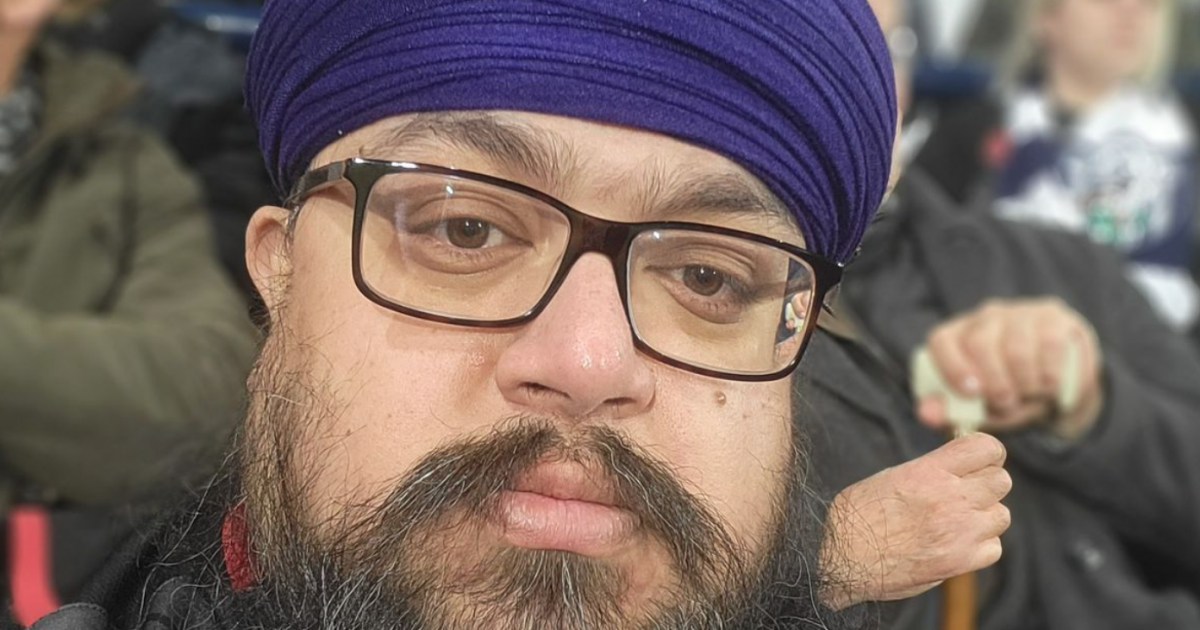A Shocking Discovery
- Tarlochan 'Tarli' Garcha, 43, went to the ER for what he thought were COVID complications, and after doctors scanned his lungs for a potential blood clot, found a whopping 22-pound cancer tumor instead.
- It took three hospitals to identify the gigantic mass, which wound being a rare type of sarcoma called liposarcoma, which grows in the fatty tissue.
- Sarcomas are cancers that arise from the cells that hold the body together. They can occur in muscles, nerves, bones, fat, tendons, cartilage or other forms of connective tissues.
- Early detection is key, therefore looking out for bone pain, blood in the stool or vomit, and of course, a lump of any size, should prompt you to seek immediate medical attention.
Unrelated to his actual breathing issues, the medical team first thought the gigantic mass might be benign, but sure enough, it was cancer.
Read More "The doctor described the tumour as expanding like a basketball, as it had been stuck behind my kidney," Tarli said in an interview, addressing his shocking health condition.
"The doctor described the tumour as expanding like a basketball, as it had been stuck behind my kidney," Tarli said in an interview, addressing his shocking health condition.“In October 2021, I caught Covid-19. I struggled with the illness but was getting better,” he said. “After the ten-day isolation period, I was compelled to return to work. I realized I was taking my inhaler a lot; up to 40 times a day.”
Thankfully, the West Midlands, England native went and got checked out, but then after the horrifying discovery, it took three hospitals (and understandably a tremendous amount of stress on Tarli’s part) to determine what type of mass he actually had.
“I was told it may be an angiomyolipoma, which is a benign tumour,” he explained. “It turned out to be a liposarcoma. It was scary that I had something so big inside of me and didn’t know about it. I lost three stone in five weeks. I am very fortunate that I decided to call the GP.”
Be Pushy, Be Your Own Advocate … Don't Settle
The survivor, who is now a proud Sarcoma UK activist, is educating people on signs and symptoms to look out for with sarcoma, so they don’t ever get to the point that he was at.
Swelling or pain around the bones, blood in the stool, and, of course, finding any kind of lump whatsoever should prompt immediate medical care.
Nurse with Bad Case of COVID Goes To Hospital For Chest Scan; Doctors Found Advanced Cancer
Learning About Sarcoma
Sarcomas are cancers that arise from the cells that hold the body together. They can occur in muscles, nerves, bones, fat, tendons, cartilage or other forms of connective tissues.
"There are hundreds of different kinds of sarcomas, which come from different kinds of cells," Dr. George Demetri, director of the Sarcoma and Bone Oncology Center at Dana-Farber Cancer Institute and Harvard Medical School, tells SurvivorNet.
The word sarcoma refers to a large array of bone and soft tissue cancers. Those are then further broken down into more specific forms of the disease, including:
- Ewing's sarcoma Cancer that typically occurs in and around the bones, often in the arms or legs, or the bones of the pelvis. It most commonly occurs in children and young adults.
- Kaposi sarcoma Rare type of cancer that causes lesions on the skin, in lymph nodes, organs and the mucous membranes of the mouth, nose, and throat. It typically affects people with compromised immune systems, such as those with HIV.
- Epithelioid sarcoma Soft tissue cancer that grows slowly. It's likely to begin under the skin of areas like the finger, hand, forearm, lower part of the leg or foot.
- Synovial sarcoma Known also as a malignant synovioma, this is a cancer that can form soft tissues such as muscle or ligaments, commonly close to joints or in areas like the arm, leg or foot.
- Osteogenic sarcoma Known also as osteosarcoma, this cancer forms in the bone and is most common in young children.
- Spindle cell sarcoma Rare form of the disease that accounts for less than 2% of all primary bone cancer cases. It's most common in adults over age 40 and often forms in the bones of the arms, legs and pelvis.
- Angiosarcoma This cancer appears in the lining of the blood vessels.
- Liposarcoma This cancer, which is the type that Tarli had, develops from fat cells and often occurs in the torso, limbs or deep within the abdominal lining.
- Chondrosarcoma This cancer occurs in the cells of the cartilage, mostly in adults over the age of 40.
"Unfortunately, most sarcomas don't cause many of the symptoms that may be associated with other cancers," Dr. Dale Shepard, director of the Cleveland Clinic Taussig Cancer Institute Phase I and Sarcoma Programs, tells SurvivorNet. Shepard also explains that this often leads to large tumors at the time of diagnosis.
Sarcoma at Age 24 and Then COVID-19 Survivor Kara Ladd Says Cancer Helped Her Overcome Coronavirus
"Soft tissue sarcomas are typically painless," Dr. Shepard adds. "Bone sarcomas may be mistaken for orthopedic injuries. A mass the size of a golf ball or larger and growing should be evaluated as a potential sarcoma. It's important that patients who do have symptoms are not dismissive of them."
Cancer and Your Health
As for taking care of your health and trying to avoid a diagnosis like this down the road, there is really no "cancer diet" that patients need to abide by, but making sure you exercise and trying to maintain a healthy weight can make a big difference.
We spoke with Dr. Ken Miller, the Director of Outpatient Oncology at the University of Maryland Greenebaum Cancer Center, who shared some guidelines with SurvivorNet for cancer survivors who are concerned about a recurrence:
- Exercise at least two hours a weekand walking counts.
- Eat a low-fat diet. The Women's Intervention Nutrition Study, which looked at early stage breast cancer patients, found that a low-fat diet was associated with reduced risk for cancer recurrence, particularly in those with estrogen receptor-negative cancers. Other studies have found that foods with a high glycemic index that are digested quickly and cause a spike in blood sugar may lead to tumor growth in lung cancer patients.
- Eat a colorful diet with lots of fruits and vegetables. The American Cancer Society recommends aiming for two to three cups of vibrant vegetables and fruits each day.
- Maintain a healthy weight. Studies have shown that being obese can increase your risk for several types of cancer.
Overall, these guidelines are good for your general health, survivor or not, to combat cancer and any other type of sickness.
Contributing by SurvivorNet staff.
Learn more about SurvivorNet's rigorous medical review process.


